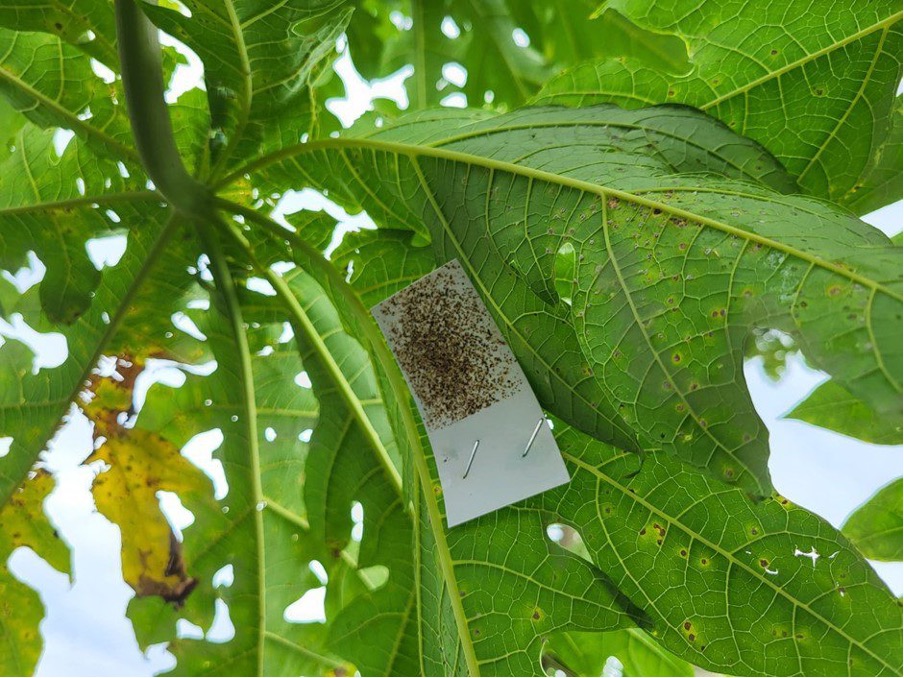
An environmentally friendly parasitoid wasp has received approval for release across Kenya, providing a natural solution for smallholder farmers battling the harmful papaya mealybug that endangers their livelihoods and food security.
The Kenya Standing Technical Committee on Imports and Exports (KSTCIE) has sanctioned the use of the biological control agent Acerophagus papayae to combat the papaya mealybug (Paracoccus marginatus) in all papaya-growing counties in Kenya over the next few months.
This decision follows a successful gradual rollout of the agent in counties such as Machakos, Embu, Tharaka Nithi, Baringo, Mombasa, Kwale, and Kilifi, where farmers have faced significant crop losses ranging from 53% to 100%.
Farmers are encouraged to adopt this agent as a part of their Integrated Pest Management (IPM) strategies while being advised to exercise patience, as the agent may take up to six months to show its efficacy.
Thorough evaluation of A. papayae’s effectiveness
The team from CABI, along with collaborators from the Kenya Agricultural and Livestock Research Organisation (KALRO), the Kenya Plant Health Inspectorate Service (KEPHIS), and the National Museums of Kenya (NMK), has diligently evaluated the effectiveness of A. papayae as part of the IPM framework.
Originally from Central America, the papaya mealybug began to spread to the Caribbean and South America in the 1990s, making its first appearance in Africa in 2010 in Ghana and in Mombasa County, Kenya, in 2016.
CABI, KEPHIS, and KALRO estimate that crop losses due to this pest amount to about £2,224 per hectare annually. However, the Kenyan authorities now have confidence in CABI’s evidence supporting the efficiency and safety of A. papayae for national deployment.
Significant reduction in mealybug populations
Research by CABI scientists at their regional center in Nairobi, published in the journal Crop Protection, found that after two years of the initial release of A. papayae in Mombasa, Kwale, and Kilifi counties, the agent achieved up to 75% mortality of the papaya mealybug.
Correspondingly, average papaya harvests nearly doubled on farms using the treatment compared to those who did not. This increase in yield translated to a roughly 20% rise in the average income of farmers benefiting from the treatment.
As part of these plans, farmers are being encouraged to minimize chemical pesticide use, allowing the biological control agents to thrive and effectively manage pest populations.
A recent survey conducted at the Coast in August 2024, while not focused on socio-economic aspects, aimed to provide a comprehensive analysis of yield improvements.
Farmers who utilized the parasitoids reported over a 100% increase in their yields, while also ceasing the use of chemical insecticides due to the effectiveness of the parasitoid.
Dr. Selpha Miller, a Postdoctoral Research Fellow in Invasive Species Management, shared that the introduction of the agent is being fully funded by partners, ensuring no cost falls on smallholder farmers. The parasitoid, Acerophagus papayae, is mass-reared at the CABI-KALRO rearing facility located in Muguga, near Nairobi.
These parasitoids are packaged on cards and distributed to farmers, who then staple them beneath papaya leaves. Upon emerging, the parasitoids seek out and parasitize the mealybugs.
Farmers Role
Farmers contribute significantly to the swift multiplication and distribution of the parasitoid on their farms. They do this by setting up Natural Enemy Field Reservoirs (NEFRs), using the technology developed by the late CABI scientist Riaz Mahmood in Pakistan.
Dr. Miller emphasized, “The widespread release of Acerophagus papayae marks a significant advancement in managing the papaya mealybug in key papaya-growing regions of Kenya. We encourage smallholder farmers utilizing this agent to remain patient as it begins to combat the mealybug as part of an Integrated Pest Management strategy.”
This initiative is financed by the CABI-led PlantwisePlus program, which operates over 150 plant clinics in Kenya dedicated to assisting farmers with their plant health challenges. Additional support comes from the Darwin Initiative project focused on the biocontrol of the papaya mealybug in East Africa.
Dr. Johnson Nyasani, Chief Research Scientist at KALRO, remarked, “The nationwide deployment of Acerophagus papayae showcases the strength of collaborative efforts in sustainably addressing a significant crop pest while decreasing dependence on chemical pesticides. This follows thorough research with CABI on the agent’s effectiveness and the readiness of smallholder farmers to incorporate it into their sustainable pest management practices.”
Research from CABI, published in CABI Agriculture and Bioscience, revealed that nearly 90% of smallholder farmers surveyed viewed the release of Acerophagus papayae positively, recognizing that biocontrol is most effective when implemented at both individual and community levels.
